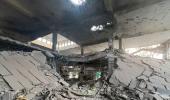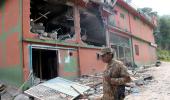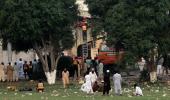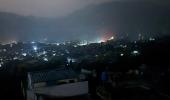'There is no independently verified imagery or battlefield evidence to support Pakistan's claim.'

India's missile strikes on targets in Pakistan and Pakistan occupied Kashmir -- named Operation Sindoor -- prompted global powers to urge both nations to 'exercise restraint'.
While many countries have voiced support for India's right to defend itself against terrorism, the risk of escalation between two nuclear-armed States has raised concerns.
Amid the heightened tensions -- the most severe in years -- Pakistan's leadership appears divided. Prime Minister Shehbaz Sharif has taken a more confrontational tone while Defence Minister Khawaja Asif has suggested a willingness to de-escalate. Yet both leaders claim that Pakistan shot down three Indian Rafale fighter jets in retaliation -- claims made without evidence.
Dr Walter C Ladwig III, associate professor of international relations at King's College London and a non-resident fellow at the Center for the Advanced Study of India, University of Pennsylvania, remains deeply sceptical of Pakistan's assertions.
In a conversation with Rediff's Utkarsh Mishra, Dr Ladwig explains why the claims of downing three Rafales are implausible -- and outlines the broader military, political, and geopolitical implications if the conflict spirals further.
The first of a two-part interview.
You mentioned in a recent online post (external link) that it is unlikely for Pakistan to shoot down India's Rafale jets. However, CNN has cited a French intelligence official reportedly confirming Pakistan's claims (external link). While Dassault has not issued a statement yet, why do you believe Pakistan's claims are not credible?
Even if French intelligence believes one Indian Rafale was lost, that does not validate the full scope of Pakistan's claim to have shot down three.
There are several reasons to remain cautious:
First, India operates only 36 Rafales -- its most advanced and politically sensitive aircraft. Losing three in a single operation would amount to nearly 10 per cent of the fleet. Such a loss would not go unnoticed inside India's tightly monitored air force structure, nor by France, which maintains close contractual oversight of the platform's maintenance and performance.
Second, it is extremely difficult to conceal multiple combat losses in a democratic system with a free press, grieving families, and widespread open-source scrutiny. While one loss might be managed for strategic reasons, three would generate ripples across personnel, logistics, and media -- ripples that, to date, have not surfaced.
Third, there is still no independently verified imagery or battlefield evidence to support Pakistan's claim. In the past, such claims have been quickly amplified with wreckage footage or POW footage -- as was the case in 2019. That has not happened here.
In short, while one downing may have occurred, the idea that Pakistan successfully shot down three Rafales without corroboration from independent sources or even circumstantial indicators remains unlikely.
Pakistan claims to have used Chinese J-10C jets in the alleged downing of the Rafales. Since then, social media has seen a flurry of comparisons between the two aircraft. In your view, how do the Rafale and J-10C stack up against each other?
The Rafale and the J-10C represent different tiers of capability.
The Rafale, a 4.5-generation multirole fighter developed by Dassault, offers a higher level of systems integration, battlefield survivability, and proven combat performance. It features advanced electronic warfare suites, AESA radar, and Meteor beyond-visual-range missiles, giving it an edge in contested environments.
The J-10C is a capable platform -- particularly with its PL-15 missiles and AESA radar -- but it remains less combat-tested and lacks the same level of integration across mission systems.
In a contested engagement, the Rafale would likely have the advantage, particularly in terms of situational awareness and countermeasures.
India's military responses to Pakistan have escalated over time -- from the 2016 surgical strikes to the 2019 Balakot airstrikes, and now missile strikes targeting sites within Pakistan proper.
How much of this escalation, in your view, is driven by military strategy, and how much by political considerations?
Given current political dynamics in both countries, how do you foresee the crisis evolving?
To view India's escalating military responses as a binary choice between strategy and politics is to misunderstand their interdependence.
As (Carl von) Clausewitz reminds us, war is politics by other means.
Operation Sindoor signals not only a tactical evolution but a political recalibration -- one in which the use of conventional force is being normalised as a legitimate and expected element of India's counterterrorism toolkit.
India appears increasingly unwilling to maintain the traditional distinction between terrorism and conventional warfare.
The operational threshold for a military response now rests not on the formal movement of enemy forces across borders, but on the occurrence of a terrorist attack emanating from Pakistani soil.
In effect, India is asserting that persistent State tolerance of anti-India militant groups constitutes an act of provocation in itself.
This shift also entails a declining appetite to produce exhaustive, internationally palatable dossiers of proof before acting.
The continued activity of anti-India terrorist groups inside Pakistan -- combined with Islamabad's unwillingness or inability to dismantle them -- is now deemed sufficient basis for punitive action.
If Pakistan wishes to avoid conventional conflict, the onus is on it to prevent terrorist violence against India, not on India to restrain its response.
Taken together, this represents both a doctrinal hardening and a political message: that Delhi views terrorism as a casus belli, and will act accordingly.
In recent years, many Indians have closely observed Israel's response to the October 7 attacks and the strong backing it received from Western powers, especially the United States. This has led to calls, particularly from right-wing circles, for India to adopt a similarly resolute posture.
But considering Pakistan is a nuclear power, might the US hesitate to back India as firmly as it supported Israel? What's your take?
The comparison is understandable, but strategically imprecise.
Israel faces non-State actors in territorially distinct enclaves; India confronts a nuclear-armed State with which it shares a long, contested border.
The degree of US alignment in each case is shaped by history, context, and perceived risk.
It is true that during the 2019 Pulwama-Balakot episode, the Trump administration offered India what amounted to a diplomatic green light.
Senior US officials publicly and privately signaled support for India's 'right to self-defence', even as it launched cross-border airstrikes.
That episode occurred within a broader framework of US-India strategic convergence and a transactional US foreign policy approach.
In the current crisis, however, Washington's tone has shifted.
The Trump administration has called for restraint on both sides, emphasising de-escalation over strategic endorsement.
While the United States continues to support India diplomatically -- particularly on counterterrorism -- their stance is different than it was in 2019.










